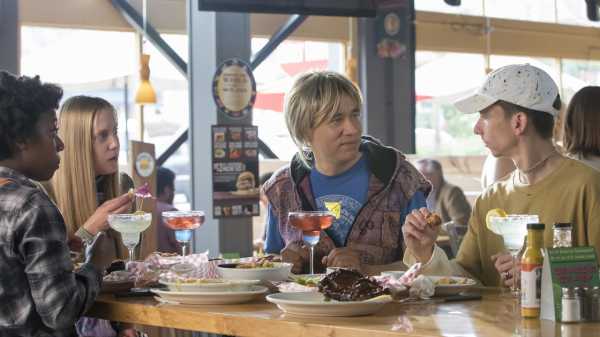
In its eight seasons on IFC, “Portlandia” has excelled at rapid
characterizations, microscopically observed comedies of manners, and
amiable lampoons of everyday anxieties—and never more so than when the
show has considered food and drink. The appetite has been, from the
start, the great subject of the show’s stars, Fred Armisen and Carrie
Brownstein, and its director, Jonathan Krisel, and they continue to heap
their buffet with it as their sketch show approaches the end of its run,
serving up lunches and dinners that flower into riffs on consumption and
community. Always exploring anatomies of taste, “Portlandia” prepares
meals that offer up, variously, drooling slapstick and astute verbal
farce.
The cultural geography of “Portlandia” figures its beloved Oregon city
as a capital of conscientious politics and progressive consumerism, and
restaurants are the sites that are most expressive of these local
sentiments. The very first episode of the series was titled “Farm,”
after the multipart sketch—an instant classic of absurdism—that provides
its spine. The story finds a couple, Peter and Nance, enjoying a meal
out and celebrating their social correctness. As they ask after the
precise bona fides of the establishment’s free-range chicken, Peter
purses his sanctimonious lips and Nance holds a vigilant stare. The
server proffers the bird’s credentials: “His name was Colin. Here are
his papers.” The couple, whose fevered thoroughness is the through line
of their recurrent appearances, visits the farm on which Colin was
raised, where they yield to the charisma of a polygamous cult leader in
a shawl-collar sweater.
At the table, as among the cultists, Peter and Nance subscribe to
systems of belief that conjure a spirit of self-satisfaction. The sketch
introduced a theme of meals savored with religious fervor, treated as
sacraments and totems by diners whose refined sensibilities lead them to
spew energetic nonsense. That same episode finds Brownstein’s Toni
inquiring about the contents of a mug clutched by Armisen’s Candace, her
colleague at a feminist bookstore named Women & Women First.
“Kombuchuchuchuchucha tea,” Candace answers. “Tastes like soot and hot
water.” The line, figuring asceticism as a gourmet delicacy, articulates
Candace’s special tone of moral sternness. This season, we have seen
Peter and Nance freak out in a sushi restaurant in one episode and celebrate
an extravagant home-cooked breakfast in another. The breakfast sketch,
with its hoopla of blueberries, conveys a joy of cooking, or at least
eating, that is universal. (This sincere pleasure rubs up against the
sketch’s teasing view of its characters, which is typical of the
“Portlandia” way.) The focus on food extends a broad invitation to an
intensely specific fictional universe.
Elsewhere in Season 8, “Portlandia” depicts meals as social rituals,
then rearranges their codes: a dinner party is jolted into horror-film
territory when a couples’ night is stormed by a newly single friend, who
stalks the premises like a demonic killer. And sometimes eating features
in the casual presentation of an odd ethical riddle, as when Armisen, in
character as “Fred,” steps on a snail while out on a nature hike with
“Carrie.” Distraught, Fred walks by himself for a while, alone with his
guilt, until he encounters a group of talking snails, who, craving
release from their slime-covered lives, beg him to crush them all. He
obliges. Things end at a restaurant, where Fred receives a plate of
escargot. The morbidity of the moment plays a certain way in greater
Portlandia, that worldwide community where citizen-connoisseurs
scrupulously dwell on goodness and wellness. Consider the gastropod, it
says, and also your noble thoughts and nice distinctions about human
pleasure and animal pain.
In a standout sketch, Armisen plays Toph, the leader of a group of
undergraduate idealists who, five days into a campus hunger strike, are
famished. Rationalizing that it would be acceptable to break for lunch,
Toph tenderly convinces his fellow-warriors that a hunger striker could,
in good conscience, put a pinch of Caesar salad behind his teeth. Also,
probably, it would be okay to snort the particles wafting from a
quesadilla that came complimentary with the salad. The bit explodes as
the students betray their ideals in an orgy of breaded morsels and
dipping sauce, with French fries crunched in slo-mo, and paper parasols
gleaming on the rims of margarita glasses. It rounds out darkly: one
protester’s sound bite—“These dunkers are good!”—is replayed and remixed
and, with the smoothness of dream logic, shoots to the top of an MTV
chart of viral catchphrases.
With its vision of capitalism devouring youthful ideals like so many
jumbo shrimp, the bit means to leave a nasty aftertaste. So does the
recent sketch in which the stars address the camera in character as
“sandwich experts” with a tech-sector sensibility. “You’re really eating
a piece of three-hundred-year-old technology,” one says, prior to
unveiling a device that proposes to revolutionize lunch by pumping
liquefied chicken through a lawn sprinkler. “No bowls, no utensils, no
bread!” The wan gloop of this techno-utopian disruption inspires a rare
kind of comic revulsion. Like all of the best food gags on “Portlandia,”
the image sticks in the head by hitting the gut.
Sourse: newyorker.com






